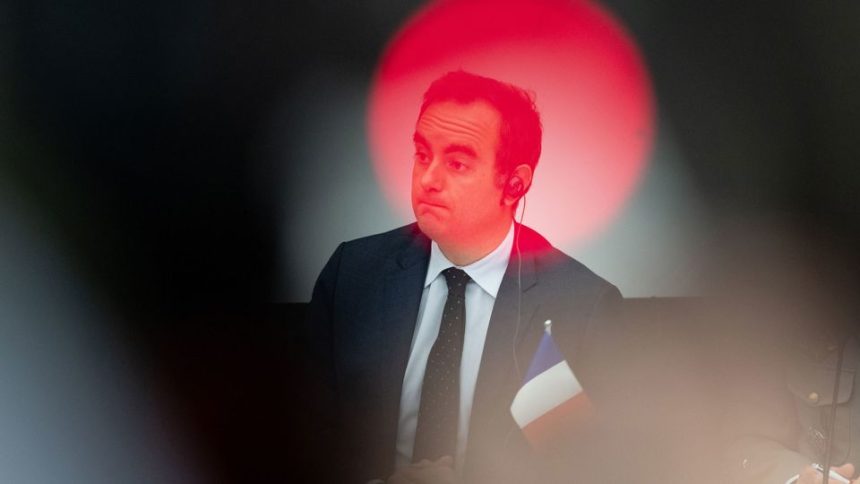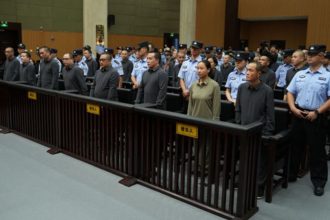For a minister, some might say Sébastien Lecornu has had an easy gig inside French President Emmanuel Macron’s government.
As France’s defense minister since 2022, he’s enjoyed a booming budget, tens of thousands of patriotic and disciplined employees under his authority and a mission – warding off Russian aggression – that few could challenge.
Plucked out of the cabinet to be the next prime minister, his new job will be significantly more difficult.
He is the longest serving sitting minister, enjoying rare stability within the French government, but now the freshly announced Prime Minister Lecornu will have to contend with the crushing calculus of a divided parliament and a budget that is seemingly impossible for the French to stomach.
When Francois Bayrou, the latest ill-fated inhabitant of France’s prime ministerial residence, the Matignon, stepped aside after calling for his own doomed confidence vote (leading many commentators to describe it as jumping ship), headlines in France have turned to his successor.
No knight in shining armor appeared – Macron is now on his seventh prime minister, so viable candidates are getting harder to find.
But the standout candidate was Lecornu.
Above all, Lecornu is, “a minister in whom (Macron) has great trust,” Marc Lazar, professor of history and politics and Paris’ Sciences Po and the LUISS school of government in Rome, told CNN.
Unlike the last two prime ministers, Lecornu has been a loyal lieutenant at the center of the president’s project in government, Lazar said. His defense background may even have been an attraction to the massively unpopular French president, offering a chance to refocus attention at home on the importance of rearming France’s military.
He’s become a cabinet staple since he was appointed in 2022 as something of a whizz-kid. At the age of 35, he became France’s youngest defense minister in living memory.
Beginning his political career in the traditional party of the French Right, ‘The Republicans,’ he joined Macron’s centrist breakthrough party after being appointed to a junior cabinet position. He subsequently wore several ministerial hats, responsible for ecology, community and then overseas territories.
As defense minister, he was certainly a survivor. Through two of Macron’s presidential terms, where upheaval has been the norm, Lecornu has been an unusually stable presence around the cabinet table.
The post has had its challenges. On his watch, the largest war in a century has been burning on the European continent, with France heavily involved in the defense of Ukraine since Russia’s 2022 invasion.
France has provided arms large and small, as well as intelligence and training to Kyiv’s embattled forces, largely steered by Lecornu’s unwaveringly pragmatic approach to his day job.
He’s overseen a doubling in the defense budget, the rollout of a new family of armored vehicles, something that has proved troublesome for allies like the UK, and flogged French arms to allies far and wide, even in the face of US competition.
It’s this success overseeing France’s military ramp-up that seemingly kept him in office.
Ideologically, he didn’t paint himself into any corners, which no doubt made him appealing as a prime minister who will have to reach across the aisles from the political center.
Unlike other ministerial colleagues, he kept a low profile around the culture wars and contentious issues of the day, be it immigration or tensions around Islam in France, bringing a quiet dignity to the cabinet in an era of brash performance politics.
‘Social Gaullism’
According to Lazar, Lecornu offers some compromise – he is a right-wing politician yet still a figure of what the French call, “Social Gaullism,” conservative politicians who aren’t afraid to hike taxes, unlike Macron’s focus on pro-business policies.
A jovial character behind the scenes, he is known to get along with the press and has won the support of the French military community, both of which will surely serve him at the Matignon.
The arithmetic of the French National Assembly – the key hurdle to getting any budget passed – hasn’t changed with a new prime minister.
Macron’s bloc still holds a weak hand in the French parliament, no longer possessing a majority or even a position as the largest party.
Lazar said the key attribute a successful prime minister must now have is the ability to unify the blocs of the National Assembly, which want to avoid another dissolution of parliament. With the far-right the only group expected to benefit from more elections, that means uniting all lawmakers from the far-left through to the traditional right-wing of France’s political spectrum.
Since Emmanuel Macron made the surprise gamble of snap elections last year, French lawmakers have been split between three blocs: the center (Macron’s newly weakened legislative crutch), a left-wing group dominated by the far-left, and a far-right bloc expecting to take power from Macron in the near future.
Coalescing under Macron’s pro-business, austerity-lite budget to tackle the country’s ballooning public debt is not their priority, nor mutual interest.
“All the choices before the president offer a tiny margin of manoeuvre. It’s extraordinarily difficult to find the right person,” politics professor Lazar said.
Even so, given the math, compromise and coalition are the only ways forward if Lecornu hopes to succeed where his predecessors – both appointed for their strengths in these areas – failed.
For more CNN news and newsletters create an account at CNN.com









